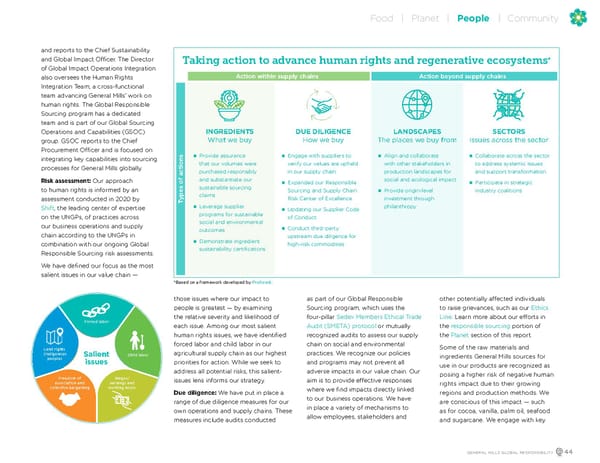and reports to the Chief Sustainability and Global Impact Officer. The Director of Global Impact Operations Integration also oversees the Human Rights Integration Team, a cross-functional team advancing General Mills’ work on human rights. The Global Responsible Sourcing program has a dedicated team and is part of our Global Sourcing Operations and Capabilities (GSOC) group. GSOC reports to the Chief Procurement Officer and is focused on integrating key capabilities into sourcing processes for General Mills globally. Risk assessment: Our approach to human rights is informed by an assessment conducted in 2020 by Shift , the leading center of expertise on the UNGPs, of practices across our business operations and supply chain according to the UNGPs in combination with our ongoing Global Responsible Sourcing risk assessments. We have defined our focus as the most salient issues in our value chain — those issues where our impact to people is greatest — by examining the relative severity and likelihood of each issue. Among our most salient human rights issues, we have identified forced labor and child labor in our agricultural supply chain as our highest priorities for action. While we seek to address all potential risks, this salient- issues lens informs our strategy. Due diligence: We have put in place a range of due diligence measures for our own operations and supply chains. These measures include audits conducted as part of our Global Responsible Sourcing program, which uses the four-pillar Sedex Members Ethical Trade Audit (SMETA) protocol or mutually recognized audits to assess our supply chain on social and environmental practices. We recognize our policies and programs may not prevent all adverse impacts in our value chain. Our aim is to provide effective responses where we find impacts directly linked to our business operations. We have in place a variety of mechanisms to allow employees, stakeholders and other potentially affected individuals to raise grievances, such as our Ethics Line . Learn more about our efforts in the responsible sourcing portion of the Planet section of this report. Some of the raw materials and ingredients General Mills sources for use in our products are recognized as posing a higher risk of negative human rights impact due to their growing regions and production methods. We are conscious of this impact — such as for cocoa, vanilla, palm oil, seafood and sugarcane. We engage with key Forced labor Salient issues Child labor Wages/ earnings and working hours Freedom of association and collective bargaining Land rights (Indigenous people) Types of actions n Provide assurance that our volumes were purchased responsibly and substantiate our sustainable sourcing claims n Leverage supplier programs for sustainable social and environmental outcomes n Demonstrate ingredient sustainability certifications n Engage with suppliers to verify our values are upheld in our supply chain n Expanded our Responsible Sourcing and Supply Chain Risk Center of Excellence n Updating our Supplier Code of Conduct n Conduct third-party upstream due diligence for high-risk commodities n Align and collaborate with other stakeholders in production landscapes for social and ecological impact n Provide origin-level investment through philanthropy n Collaborate across the sector to address systemic issues and support transformation n Participate in strategic industry coalitions INGREDIENTS What we buy DUE DILIGENCE How we buy LANDSCAPES The places we buy from SECTORS Issues across the sector Action within supply chains Action beyond supply chains Taking action to advance human rights and regenerative ecosystems * *Based on a framework developed by Proforest . GENERAL MILLS GLOBAL RESPONSIBILITY 44 Food Planet People Community
 GeneralMills Global Responsibility Report Page 45 Page 47
GeneralMills Global Responsibility Report Page 45 Page 47